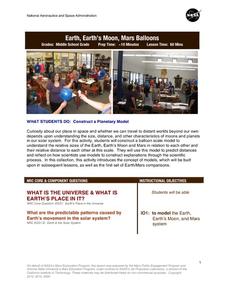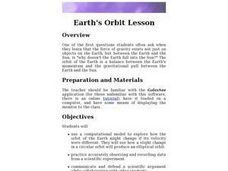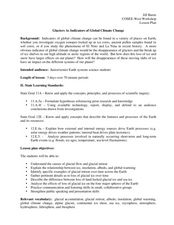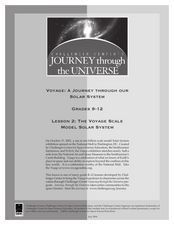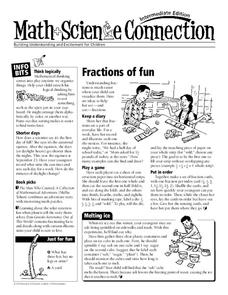Curated OER
Lesson Plan on Kepler's Laws of Planetary Motion
Students construct a solar system model. In this space science lesson, students calculate the eccentricity of a planet's orbit. They calculate the period of a planet's revolution using Kepler's formula.
NASA
Earth, Earth’s Moon, Mars Balloons
Very specific diameters are given for blowing up three different balloons to represent, in scale, the moon, Earth, and Mars. In groups of three, amateur astronomers explore scale measurements and distance in space.
Curated OER
The Earth, Sun Mood and Stars Unit (Planets too!)
Fifth graders prepare five activities to do then show their energy saving skills. In this investigative lesson students create five projects then participate in an energy saving demonstration.
Curated OER
Jupiter - King of the Planets
In this Jupiter activity, learners read a passage about the environment and atmosphere of Jupiter. Students then answer several multiple choice questions about the passage.
Curated OER
Earth's Orbit Lesson
Tenth graders devise a computational model to explore how the orbit of the Earth might change if its velocity were different. Using accurately recorded data, 10th graders defend a scientific argument.
Curated OER
Day and Night
Inform your elementary scientists why we experience day and night. They are provided with facts and explanation as to why the day and night cycle occur, discuss what they've learned with a partner, and are then given the task of writing...
Curated OER
Using Bloom's Taxonomy in Science
Help your students internalize knowledge by creating activities that utilize higher level thinking skills.
Curated OER
Asteroids!
Young scholars explore how to visually identify asteroids in SDSS images. They are able to explain that stars are so far away that they do not appear to move, even over the course of a human lifespan. Students identify the location of...
Curated OER
Glaciers As Indicators of Global Climate Change
Students research about glacial ice melting on the four major spheres of the Earth. In this earth science instructional activity, students explain how this process relates to global warming. They create a presentation and share their...
Curated OER
Weather, Sea Level Rise and Climate Change Course
Young scholars explain the impact of glacial melting to global climate change. In this environmental science lesson plan, students design an experiment to investigate the effect of salinity change to melting glaciers. They share their...
Curated OER
Sky Stories Curriculum
Students investigate the stories told by ancient cultures about the constellations. They listen to stories told by the Greeks and Romans. The classroom should have posters of constellations for the lesson and the teacher performs...
Curated OER
Astronomy Teamwork
Pupils work together in groups to complete an astronomy project. In the classroom, they find real objects to represent various objects in the solar system. After going outside, they practice using a distance scale and use their objects...
Curated OER
Got Space?
Students explore our solar system of planets through research and activities. Using cooperative grouping and interaction, students gain an understanding of how the characteristics of the planets differ from one another.
Curated OER
Nature of Meteor Showers
Ninth graders describe, in general terms, the distribution of matter in space and
identify evidence for, and describe characteristics of, bodies that make up the solar system. They then investigate predictions about the motion,...
Curated OER
Suited for Space
A fantastic lesson on survival in outer space should excite your learners! Pupils explore the challenges that living, working, and surviving in space elicit. They focus on the spacesuit itself; how it protects astronauts, and enables...
Curated OER
Saturn’s Moons
Students compare Saturn's moons to the Earth's moon. In this moon instructional activity students work in groups and complete a lab activity then answer questions.
Curated OER
Two Views of the Universe
Students build the two models of the universe created by Aristotle and Copernicus. They compare and contrast the two universes. They create hypothesis on how each model functions.
Curated OER
Planetary Diversity
Students explore the infrared radiation and the part of the spectrum that is not always visible. In this electromagnetic lesson students complete a lab activity on the different wavelengths.
Curated OER
The Voyage Scale
Pupils identify how models are powerful tools of exploration and that the sizes of the planets and distances between the planets in the Solar System span a large range. They make a sign for each planet they have created in the lesson...
Curated OER
Unit 2 Sun & Stars
Students describe stellar objects using terms such as stars, planets, satellites, orbits and light. In this sun and stars unit, students research stellar objects through seven individual lessons discovering star characteristics, how...
Curated OER
Scientific Notation
Students explore the concept of expressing numbers in scientific notation. In this scientific notation lesson, students understand the importance of using scientific notation by finding real world examples where scientific notation is...
Curated OER
How Big Are Earth, Sun, and Moon?
Third graders draw what they believe is in space on a dry erase board. In groups, they are given a beaker half filled with water and they add a teaspoon of oil, observing the different layers that form. To end the lesson, they identify...
Resources for Educators
Fractions of Fun
Reinforce concepts and encourage learner engagement with a collection of math games, science experiments, and cross curricular activities. In one fun resource, learners sort objects, keep a diary of everyday fractions, play a game using...
Curated OER
Meteors
Students identify the different types of meteorite using an interactive website. In this earth science lesson, students simulate how meteors crash on a surface. They relate meteor size to crater size.



